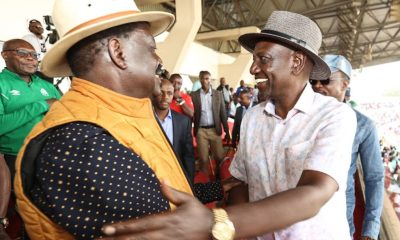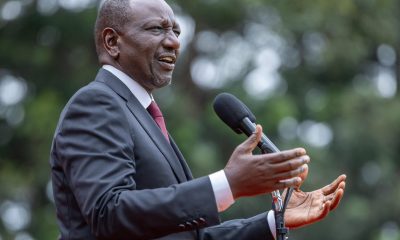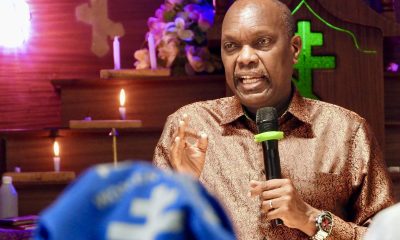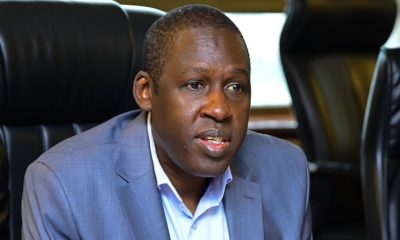Politics
Our Deal With Ruto Ends in 2027 and Not Beyond, Raila Says
“We shall give direction later on whether we will field a presidential candidate or not,” he added.
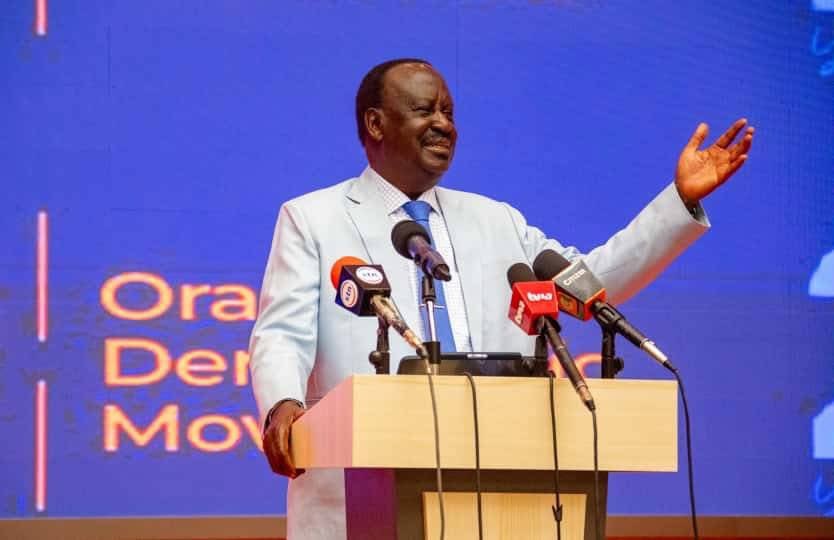
Machakos, Kenya — Former Prime Minister Raila Odinga has clarified that the Orange Democratic Movement’s (ODM) political pact with President William Ruto’s United Democratic Alliance (UDA) will expire in 2027, dismissing claims that the agreement extends beyond the next general election.
Speaking on Sunday during an ODM parliamentary group meeting in Machakos County, Raila said the deal should not be misconstrued as a blanket endorsement of Ruto’s re-election bid, stressing that any decision on 2027 will be determined by ODM’s internal processes.
“Look at what we have signed. We must remain ODM. We signed and agreed that we will work together up to 2027,” Raila told the gathering, which brought together party legislators and top officials ahead of ODM’s 20th anniversary celebrations slated for October.
The veteran opposition leader faulted some members of his party for prematurely suggesting that ODM had already resolved to back Ruto’s second-term ambitions under the “Tutam” slogan championed by UDA loyalists.
“We have not passed any resolutions as a party to say how we are going to go into the elections of 2027,” Raila said, urging restraint among members. “Wherever you are, don’t commit the party to some things which have not been discussed. Let them be discussed first.”
His remarks were met with applause and cheers from the assembled lawmakers, signaling broad support within the party ranks for his insistence on internal consensus.
ODM’s working arrangement with the Ruto administration has fueled speculation about the party’s long-term strategy, especially as it seeks to reposition itself ahead of 2027.
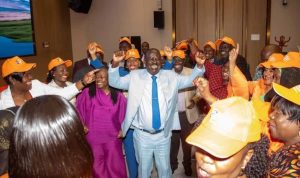
Former Prime Minister Raila Odinga share a jovial moment with other members of the ODM party during the retreat on September 22, 2025 / ODM X
Raila insisted the pact was tactical and limited in scope, noting that ODM would chart its electoral path when the time comes.
“We shall give direction later on whether we will field a presidential candidate or not,” he added.
Raila’s clarification appears aimed at tamping down internal dissent while keeping ODM’s options open.
By stating that the deal with Ruto is strictly time-bound, he is seeking to reassure his supporters that ODM is not being absorbed into the ruling coalition.
For President Ruto, Raila’s remarks are a mixed signal.
On one hand, ODM’s cooperation until 2027 provides the government with legislative stability and a semblance of national unity.
On the other, Raila has now drawn a line in the sand, effectively warning UDA that ODM is not committed to backing his re-election bid.
Within ODM, the statement reflects the tension between pragmatists, who favor cooperation with Ruto to secure development gains, and loyalists, who see such an alliance as undermining the party’s independence.
Raila’s caution suggests he is aware of the risk of alienating ODM’s traditional base in Nyanza, Coast, and Western Kenya, which has long viewed him as the face of opposition politics.
Raila’s approach to political alliances has often followed a familiar pattern: short-term tactical deals, followed by an eventual reassertion of independence.
•2008 Grand Coalition with Mwai Kibaki: After the disputed 2007 elections, Raila entered a power-sharing deal with Kibaki under international mediation. While it stabilized the country, Raila later struggled with frustrations over being sidelined as Prime Minister, and ODM eventually drifted back into opposition.
•2018 Handshake with Uhuru Kenyatta: The truce ended months of post-election turmoil and gave Raila influence over major state reforms, including the Building Bridges Initiative (BBI). But by 2022, ODM’s closeness to Uhuru hurt its outsider appeal and arguably weakened Raila’s presidential bid against Ruto.
•2023 Pact with Ruto: This latest arrangement appears designed to guarantee ODM space in the political mainstream while buying time until 2027. However, Raila’s insistence on its expiry date suggests he is wary of repeating past mistakes where tactical deals diluted ODM’s brand and cost him politically.
What It Means for 2027
By limiting the pact to 2027, Raila is signaling that ODM will not automatically back Ruto’s re-election.
This ambiguity keeps ODM’s options open: the party could field its own candidate, negotiate a broader opposition coalition, or strike a fresh deal depending on the political climate.
But the risk remains: if ODM appears too close to Ruto, it could alienate its grassroots. If it breaks away too sharply, it risks losing the benefits of government partnership.
For now, Raila’s careful positioning keeps ODM relevant but it also prolongs uncertainty over who will be the real challenger to Ruto in 2027.
Kenya Insights allows guest blogging, if you want to be published on Kenya’s most authoritative and accurate blog, have an expose, news TIPS, story angles, human interest stories, drop us an email on [email protected] or via Telegram
-

 Grapevine2 weeks ago
Grapevine2 weeks agoA UN Director Based in Nairobi Was Deep in an Intimate Friendship With Epstein — He Even Sent Her a Sex Toy
-
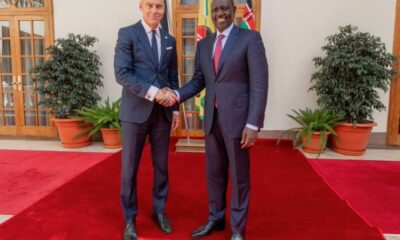
 Development3 days ago
Development3 days agoKenya Strips Dutch Climate Body of Diplomatic Immunity Amid Donor Fraud Scandal and Allegations of Executive Capture
-

 Investigations1 week ago
Investigations1 week agoHow Mexico Drug Lord’s Girlfriend Gave Him Away
-

 Business2 weeks ago
Business2 weeks agoSafaricom Faces Avalanche of Lawsuits Over Data Privacy as Acquitted Student Demands Sh200mn Compensation in 48 Hours
-
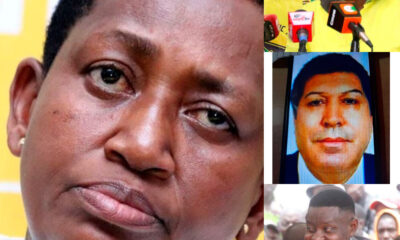
 Investigations1 week ago
Investigations1 week agoHow Close Ruto Allies Make Billions From Affordable Housing Deals
-

 Entertainment2 weeks ago
Entertainment2 weeks agoKRA Comes for Kenyan Prince After He Casually Counted Millions on Camera
-

 Politics2 weeks ago
Politics2 weeks agoI Personally Paid For Your Ticket To Visit Raila in India, Oketch Salah Silences Ruth Odinga After Claiming She Barely Knew Him
-

 Business1 week ago
Business1 week agoAmerican Investor Claims He Was Scammed Sh225 Million in 88 Nairobi Real Estate Deal





